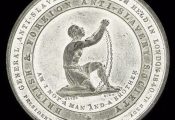William Wilberforce (1759-1833) was a Member of Parliament for Hull and later Yorkshire. His many causes included the reformation of manners amongst the gentry, but his most famous campaign was for the abolition of the slave trade. Whilst the popular public abolition movement was growing outside Parliament with petitions and anti-slavery meetings; Wilberforce was the chief spoke person against the slave trade in Parliament.
This oil portrait shows William Wilberforce (1759 – 1833) at the age of 29 in 1788, the year in which he took up the cause of the abolition of the slave trade in Parliament. In 1789 Wilberforce gave an impassionate anti-slave trade speech which lasted over three-and-a-half hours. It was not until 1807 that the abolition of the slave trade was passed in Parliament. It would take a further twenty-six years for Britain and its colonies to abolish slavery.
The painting is by John Rising (1753 – 1817), a portrait painter based in Grosvenor Square, London. The painting was exhibited in 1790 at the Royal Academy as a Portrait of a Gentleman (Mr Wilberforce) and was commissioned by Lord Muncaster, a friend of Wilberforce’s.
© Hull Museums


